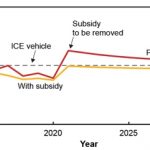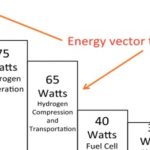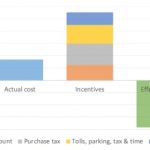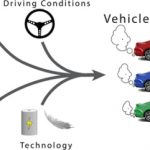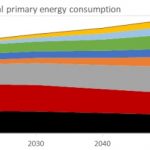MEPs and governments are currently deciding on an EC proposal for all new cars sold from 2035 to be 100% zero-emissions. Here, T&E present test results that show e-fuels should not be allowed to replace petrol. T&E are concerned that e-fuels are being promoted as a way to prolong the life of ICE vehicles. But their tests show that e-fuels produce just as much NOx, three times more carbon monoxide, and twice as much ammonia. Though e-fuels … [Read more...]
The 10 big problems with simply replacing fossil cars with electric
The planned rapid transition to electric vehicles has major challenges. Schalk Cloete compiles them into a list of ten, including: preserving our car-centric cities preserves its inefficiencies and societal costs; it works against much of the personal “behaviour change” we need; though BEVs (battery electric vehicles) are better in cities, when infrastructure costs are included they are less efficient than hybrids and modern ICEs for many driving … [Read more...]
Norway an EV role model? Their pathway is expensive and paid for with oil & gas exports
Norway is an EV leader thanks to a generous pot of tax incentives. Today, battery-electric cars make up more than half of all new car sales in Norway. Schalk Cloete takes a detailed look at what those incentives cost, and how many tonnes of CO2 they avoid. In short, Norway – a major oil and gas exporter - needs to sell over 100 barrels of oil (which emits 40 tonnes of CO2) to pay for the tax breaks it gives EVs to avoid one tonne of CO2. And … [Read more...]
China’s car sales target: 40% EVs by 2030 will cost CNY 100bn/year (€13bn, $15bn)
By the end of the 2020s China will phase out EV subsidies and instead rely on a mandate imposed on manufacturers to target 40% of car sales being electric by 2030. Nancy Stauffer at MIT reviews a study that estimates the new rules will result in 66m EVs sold in China in the next 10 years. That will move EVs well into the mainstream and have global consequences. According to the study, the total cost of that transition will be 100bn yuan/year … [Read more...]
Only giving tax breaks to zero-emission company cars will accelerate e-mobility
Subsidies and tax breaks for company cars in Europe cost €32bn a year, a hangover from the days when governments were happy to encourage driving. Chris Bowers at T&E reviews a study that explores the issue in a wide range of European nations and reveals that 96% of company cars are petrol and diesel. As an indicator of the scale of emissions, the study says Europe’s 10 largest leasing companies alone – which include BMW’s Alphabet and … [Read more...]
Energy conversion for Hydrogen cars is only half that for BEVs
Though Toyota may be a big fan, hydrogen cars have a problem. Energy must move from wire to gas to wire to power the car. There are always significant losses when the energy vector changes. For Battery Electric Vehicles (BEV) the energy stays on wires all the way to the car. Tom Baxter at the University of Aberdeen looks at the losses at each stage to show that for hydrogen only 38% of the original electricity gets used. For BEVs it’s 80%. … [Read more...]
How much subsidy do EVs need to be competitive?
Despite a wide range of subsidies and incentives, battery electric vehicles (BEV) make up only 1.4% of new car sales in the U.S. That the effective battery cost is zero to the consumer doesn’t seem to be lifting that number any higher. Meanwhile, in Norway the percentage is a much more impressive 42%, but those subsidies and incentives are far higher: the effective battery cost is negative 385 $/kWh for a typical 60kWh battery pack, i.e. a very … [Read more...]
Accelerating electromobility in east Europe: a how-to guide (part 1)
While record electric vehicle (EV) sales in high income countries keep making headlines they’re struggling to take off anywhere else. Sarah Keay-Bright plots a pathway for change. Like anywhere else, public investment must come first, carefully paving the way for private to follow. So that means getting the tax regime right. As taxes rise to disincentivise fossil cars those revenues will fall as people go electric. So they need to be replaced. … [Read more...]
Lightweight Gasoline Cars: a necessary 30-year stop gap?
We should all be driving electric vehicles. But we have to wait for renewable electric grid capacity to support them all, charging points everywhere, and enough new batteries to be manufactured and put in all the new, affordable BEVs. And we’re running out of time. An interim solution has come from a study by MIT and Ford. David Chandler, writing for MIT, explains the study, which says that an interim solution – for certain regions - is … [Read more...]
An independent Global Energy Forecast to 2050, to compare with the IEA’s WEO 2019
Schalk Cloete is creating his own Global Energy Forecast to 2050. He wants to see how his own independent analysis will match up with the next IEA World Energy Outlook, due in November. And so do we. Rich with data, his major predictions include a global policy shift from technology-forcing to technology-neutrality shortly before 2030, driven by growing worldwide acceptance of the severity of climate change. The exhaustion of the 1.5°C and, … [Read more...]





